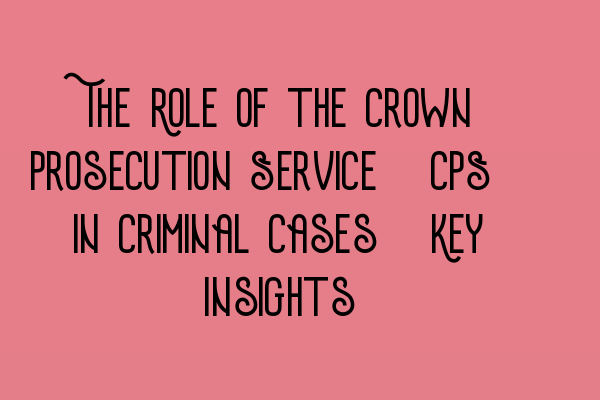The Role of the Crown Prosecution Service (CPS) in Criminal Cases: Key Insights
In the criminal justice system of the United Kingdom, the Crown Prosecution Service plays a vital role. As a solicitor, it is crucial to understand the workings of the CPS, as they are responsible for making the decision on whether or not to prosecute a criminal case.
The Crown Prosecution Service (CPS)
The CPS is the principal prosecuting authority in England and Wales. It is an independent body that operates under the umbrella of the Attorney General’s Office. Their primary duty is to decide whether the evidence provided by the police is sufficient to bring a case to court. This decision is made according to the Code for Crown Prosecutors, which sets out the legal test for prosecuting cases.
One of the key elements in the CPS’s decision-making process is the public interest. They review each case thoroughly and consider factors such as the seriousness of the offense, the impact on the victim, and the potential harm to the community. It is important to note that the CPS will only proceed with a case if there is a realistic chance of conviction and if it is in the public interest to do so.
Once the CPS decides to prosecute, they will present the case in court on behalf of the state. They work closely with the police and other investigative agencies to gather evidence, interview witnesses, and prepare the case for trial. Their aim is to be fair, objective, and present the strongest possible case against the defendant.
Key Insights into the Role of the CPS
1. Prosecution Decision: The CPS reviews evidence provided by the police to determine whether there is a realistic chance of conviction and if it is in the public interest to prosecute.
2. Case Preparation: The CPS works closely with the police and other agencies to build a strong case by gathering evidence, interviewing witnesses, and ensuring all relevant information is presented.
3. Court Presentation: The CPS represents the state in court, presenting the case against the defendant. They aim to prove the defendant’s guilt beyond a reasonable doubt, following the principles of fairness and justice.
4. Reviewing Decisions: The CPS has procedures in place for reviewing and reconsidering decisions to prosecute or discontinue cases, ensuring that justice is served and mistakes are rectified.
5. Collaboration and Cooperation: The CPS works closely with the police, witnesses, and other stakeholders involved in the case to ensure a smooth and efficient prosecution process.
It is essential for aspiring solicitors to have a comprehensive understanding of the role played by the CPS in criminal cases. This knowledge can help in providing effective legal advice to clients and ensuring a fair trial process.
For more information on the SQE Criminal Law & Practice and related courses, check out our SQE 1 Preparation Courses and SQE 2 Preparation Courses. Stay updated with the latest exam dates by visiting the SRA SQE Exam Dates page. You can also enhance your learning by practicing with our SQE 1 Practice Exam Questions and SQE 1 Practice Mocks FLK1 FLK2.
